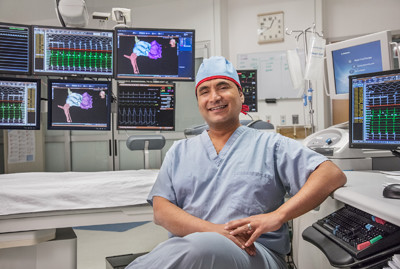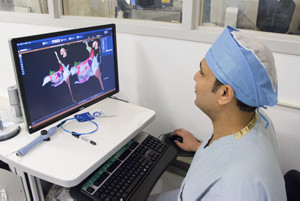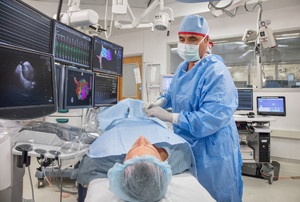Revolutionary electrophysiologist, travel enthusiast and dedicated foodie: Dr. Hany Demo
As told by Hany Demo, M.D.

We sat down with Dr. Hany Demo to learn why he chose cardiology, why Swedish Hospital is a community leader in heart care and where to find the best foie gras in Chicago.
How I fell in love with heart health

When I was a little boy in Egypt, I could see the way my uncle—a surgeon—was impacting the lives of others. His stories are one of the many reasons I fell in love with medicine at such a young age.
I didn’t know exactly what that meant for me until I learned about Dr. Magdi Habib Yacoub, an Egyptian
cardiologist who performed the first heart transplant in England. From that point forward, the more I learned about
cardiology, the more I grew to love it.
The heart is essentially a pump, and like all pumps there are three components: the mechanical, the plumbing and the electrical. As an electrophysiologist, I treat the electrical system of the heart.

Swedish Covenant Health as a community leader
When I first began practicing in Chicago, I received an offer to work at a large university institution, but I turned it down. I wanted to work in a place that's able to provide the kind of world-class, specialized care often associated with larger institutions directly to the community.
At Swedish Hospital, we are way ahead of the curve in our approach to
correcting heart irregularities due to its electrical system. Traditionally, procedures like ablations are done with x-ray. The problem with this is that these surgeries can take up to four or five hours, and the amount of radiation patients and surgeons are exposed to during this time can be harmful.

We are the only hospital in Chicago that does ablations without any x-ray whatsoever. Instead, we use 3-D mapping technology along with intracardiac ultrasound. This method is so effective that we can operate on mere millimeters without any sort of radiation.
I was recently part of a team that presented a study on this approach to the Heart Rhythm Society—the country’s highest authority on electrophysiology—and the European Heart Rhythm Society. We examined 450 patients who received an ablation without x-ray and determined the approach was just as effective as the traditional approach, without the risks associated with radiation.
Our findings were later published in
Pacing And Clinical Electrophysiology (PACE), a very well respected peer reviewed journal.
Swedish Hospital also uses cryoablation to treat paroxysmal Atrial Fibrillation (AFib) and cure arrhythmia, which is becoming more common as our community continues to live longer. We use a balloon and extreme cold instead of the traditional use of a pointed catheter with extreme heat, which bypasses the risk of leaving small leaks. This is the future of paroxysmal AFib treatment altogether.
The third procedure that makes Swedish Hospital unique is our use of the subcutaneous defibrillator. A defibrillator is similar to a
pacemaker but acts more like the paddles you always see on TV, shocking the heart when it needs to correct a potentially dangerous irregular heartbeat.
Traditionally, one part of the defibrillator is inserted into the patient’s heart through their veins, but we place it just under the skin on top of the sternum. It’s less invasive, and it delivers the same shock with the same results.
How working at an independent hospital allows me to better care for my patients
In this day and age, finding a standalone hospital is a rare thing. With an independent hospital like
Swedish Hospital, there is less bureaucracy and red tape to work through. These things have the potential to delay patient care.
My personal patient philosophy is to deliver the most personalized, compassionate care to my patients and treat them like family using the most advanced and safest technology available according to the most recent guidelines. Swedish Hospital has allowed me to do that.

What's more important, travel and food
My wife is a
neurologist and we constantly tease each other about what is more important: the brain or the heart. She’ll say, “Well, what’s the point in having a heart if your brain isn’t working?” And I’ll say, “Well, what’s the point of having a brain if you can’t supply it with blood and keep it working?”
When we’re not debating, we love to travel. In 2012, we made it a rule to visit at least one new place each year. My favorite places have been Sydney and Paris, but we’ve also had the pleasure of seeing London, Barcelona, Berlin, Florence, Rome, Venice, Luxembourg, Amsterdam, Brussels, Sydney, New Zealand, Canada, Mexico and Honduras.

While in Chicago, my wife and I love to try different restaurants. If I were to hand out recommendations, I have to mention Sunda for sushi and the foie gras at Cindy’s Rooftop Restaurant, but be warned: it’s a huge portion, so bring a friend!
Hany Demo, M.D., is a board-certified cardiac electrophysiologist with Endeavor Health Medical Group. His clinical interests include endovascular medicine, pacemaker and ICD implantation, radiofrequency ablation (RFA), atrial fibrillation, cryoablation and arrhythmia management. He has more than 10 years of experience.
To schedule an appointment with Dr. Demo, please call
773-878-8200.
By David Modica | Published February 23, 2017

